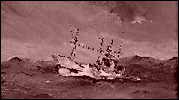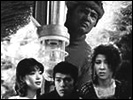The Catch
- Year
- 1983
- Original title
- Gyoei no Mure
- Japanese title
- 魚影の群れ
- Director
- Cast
- Running time
- 140 minutes
- Published
- 10 October 2002


by Jason Gray
Tuna fishing. It doesn't exactly evoke the stuff of drama, yet very dramatic is this gripping yarn (puns intended) about the solemn, solitary lives of the men who catch what ends up as our sushi and sashimi. Opening with a shot of a young couple traversing sand dunes, the woman posits a question - women or fishing? This question fuels the drama of the next two-plus hours.
After the first of three title cards in the film ('The First Summer'), we're introduced to Fusajiro (Ken Ogata), a veteran fisherman, and his dutiful young daughter Tokiko (Masako Natsume). They live in Oma, on the northernmost tip of the Japanese mainland. It's summer (tuna season), and Fusajiro has just hauled in a massive catch which will clear his debts, but it's only a stopgap in a business of diminishing returns. His daughter attempts to bring up the boyfriend she's become quite serious about, but her father quashes any notion of a city boy marrying into a fishing clan. A man of few words, he goes out on a night expedition to work out his thoughts. He decides to visit Shunichi (Koichi Sato) at his shop. It turns into a tense standoff culminating in Fusajiro smacking Shunichi down and Shunichi begging not for Tokiko's hand in marriage, but to be taught the art of angling. He's denied.
Determined Shunichi repeatedly waits at the docks, like a student outside of the gates of Shaolin Temple. When he finally gets his chance to board Fusajiro's boat (the 'Daisan Tokimaru'), it couldn't go more disastrously. After Shunichi suffers a major bout of seasickness, Fusajiro hooks a tuna on the line. Shunichi, still dazed, sits nearby as the metallic fishing line flies off its core. In a startling revealing shot, Fusajiro turns around to see Shunichi's head and body completely tangled in the line, blood gouting out of fissures as the fighting tuna pulls the line tighter and tighter. Amazingly, Fusajiro is able to untangle him and call for help, but instead of going to shore, he goes back to work! With Shunichi laying motionless on the deck, Fusajiro engages in an almost real-time battle of wills with his prey, and wins. It's a visceral scene of great drama.
Naturally, Tokiko berates her father for his inhumanity and it creates a scar deeper than the ones that now criss-cross Shunichi. 'One Year Later', Tokiko and Shunichi (now married) are estranged from Fusajiro. After being disallowed by local Hokkaido fisheries from unloading an out-of-bounds catch, Fusajiro stops over for a couple days. In a bizarre sequence, he spots a woman from the window of his ryokan and a wordless chase ensues along sea-spray slicked roads. It turns out to be his ex-wife (played by Yukiyo Toake, who was in one of the Zatoichi films). She's a bit of a lush and a flirt, and they go through the motions of reconciling, rekindling, and realizing why they split in the first place. There's a refreshing frankness to their pillow-talk and she pegs his character with a fishing analogy: "You can't tell people from fish. You just hook them and pull. When they object you hit them. You hit them and keep them." After saying their goodbyes, Fusajiro loses his next battle at sea - he's getting too old.
The 'End of Summer'; Fusajiro returns to Oma and meets his daughter. Shunichi now has his own boat and has become a fisherman, though an unsuccessful one with an inferiority complex larger than a big catch. After some strained domestic scenes between the couple (culminating with Shunichi raping his own wife), Shunichi is lost at sea. Tokiko has nobody to turn to but her father, who ventures out to find him in a tragic, poetic finale.
Based on a novel by Akira Yoshimura (whose work also served as the basis for Imamura's The Eel) and with a screenplay by prolific writer Yozo Tanaka (Flower and Snake, Wife to Be Sacrificed, Zigeunerweisen, Jigoku [1979]) the drama of The Catch quietly builds until the deafening radio silence of the last sequence. Also noteworthy is the excellent photography by Mutso Naganuma (recent award-winner for Jyuugosai). A night scene at the docks lit by fireworks, and the incredibly powerful shot of Fusajiro standing defiant at the prow of his boat in the driving rain are standouts. Aside from an intimate scene below-deck between Fusajiro and his ex, close-ups aren't used, effectively reflecting the emotional distance that exists within the characters.
One of Japanese cinema's best actors (and probably most famous for his roles in Vengeance Is Mine and Mishima), Ogata strikes a very masculine figure in his maguro-red sweater and bandana (a visual nod to The Deer Hunter?). I don't know if Mr. Ogata subscribes to the theory of 'method acting' (or if the theory exists in Japan), but when the camera sits static during his struggles at sea, there's no doubt that he's actually doing it. Koichi Sato (who would be familiar to foreign audiences in films such as Gonin and Tokarev) exudes the young stubbornness of a man who can't accept his own lack of natural ability.
This 1983 production falls in the middle of Shinji Somai's filmography. Starting his career as an assistant director on several Nikkatsu Roman Pornos, as well as a string of youth-oriented films, he was a talented director who unfortunately passed away in 2001 before getting the foreign recognition his films deserved. Thankfully, there have been domestic retrospectives of his work. His final film, Kaza Hana (2001), starred Tadanobu Asano and Kyoko Koizumi.